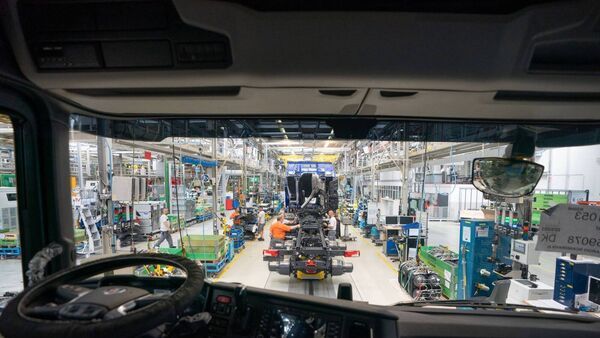European industrial groups suffering high energy prices
European industrial giants have feared for months that gas shortages will paralyze production this winter. But even with available fuel, companies cannot afford it. "It's not about standing still

European industrial giants have feared for months that gas shortages will paralyze production this winter. But even with available fuel, companies cannot afford it.
"It's not about standing still. It's the prices, it's the costs," said Christian Levin, general manager of Traton, Volkswagen's truck manufacturing unit.
Europe pays seven times more for gas than the United States, underscoring a dramatic erosion of the continent's industrial competitiveness that threatens to do lasting damage to its economy. With Russian President Vladimir Putin doubling down on the war effort in Ukraine, there are no signs that gas flows - and significantly lower prices - will return to Europe any time soon.
Signs of economic change are already afoot: Germany, Europe's largest economy, saw its usual trade surplus shrink as rising costs of imported energy offset exports of high-energy cars and machinery, and chemical companies began to move production offshore . Last month, German producer prices rose by a record 46%.
If the crisis persists, the plastics manufacturer Covestro will not make any growth investments in Europe and will instead look to Asia, where CEO Markus Steilemann said the company can secure energy at prices 20 times cheaper than on the German and European spot markets. Volkswagen, Europe's biggest carmaker, warned last week it could shift production out of Germany and Eastern Europe if energy prices don't come down.
Chancellor Olaf Scholz is due to travel to the Middle East this weekend with a group of business leaders to secure liquefied natural gas deals with Saudi Arabia and Qatar to offset cuts in Russia.
But negotiations have been difficult as gas suppliers, including Qatar, played hard over the price and length of possible deals, German officials said. Discussions with suppliers in Europe and North America proved equally complex and underscored Scholz's difficulties in securing supplies at prices that keep Germany competitive as a business location.
Covestro expects its fuel bill to top €2.2 billion in 2022, almost four times the cost in 2020, the year before Russia began choking off gas supplies from Europe.
"At the current price level, Germany's energy-intensive industry is no longer competitive worldwide," said a Covestro spokeswoman. "For a number of chemicals, imports from the US or China are already cheaper than local production."
Whenever possible, automakers like Volkswagen and BMW are switching from gas to oil or coal to keep the plants running. However, some energy-intensive manufacturing processes - such as metals, paper and ceramics - are no longer viable, leading to a growing number of companies closing, offshore production or, like chemical giant BASF, importing key materials like ammonia from competitors. Mercedes-Benz has even ramped up production of key car parts to stockpile in case German factories have to close.
"These allegations cause lasting damage to the industrial heart of our economy," said Christian Seyfert, CEO of VIK, an interest group for energy-intensive companies. "We urgently advise politicians to take decisive action so that Germany and Europe as a business location are not completely left behind internationally." Governments across Europe, where industrial production accounts for around a quarter of the economy, are taking urgent measures to strengthen public services and the to cushion the effects of the crisis.
Perhaps the highest usage is in Germany, where industrial production accounts for around 30% of the economy and employs around 1.15 million people. Energy-intensive factories across the country supply everything from transmission components for cars to chemicals used in medicine to everyday plastics.
"Our companies can no longer cope with any further burdens," said Wolfgang Große Entrup, president of the Chemical Association VCI, an organization representing BASF and Evonik Industries AG, the main suppliers to the German automotive industry. “The situation is getting more and more dramatic.
